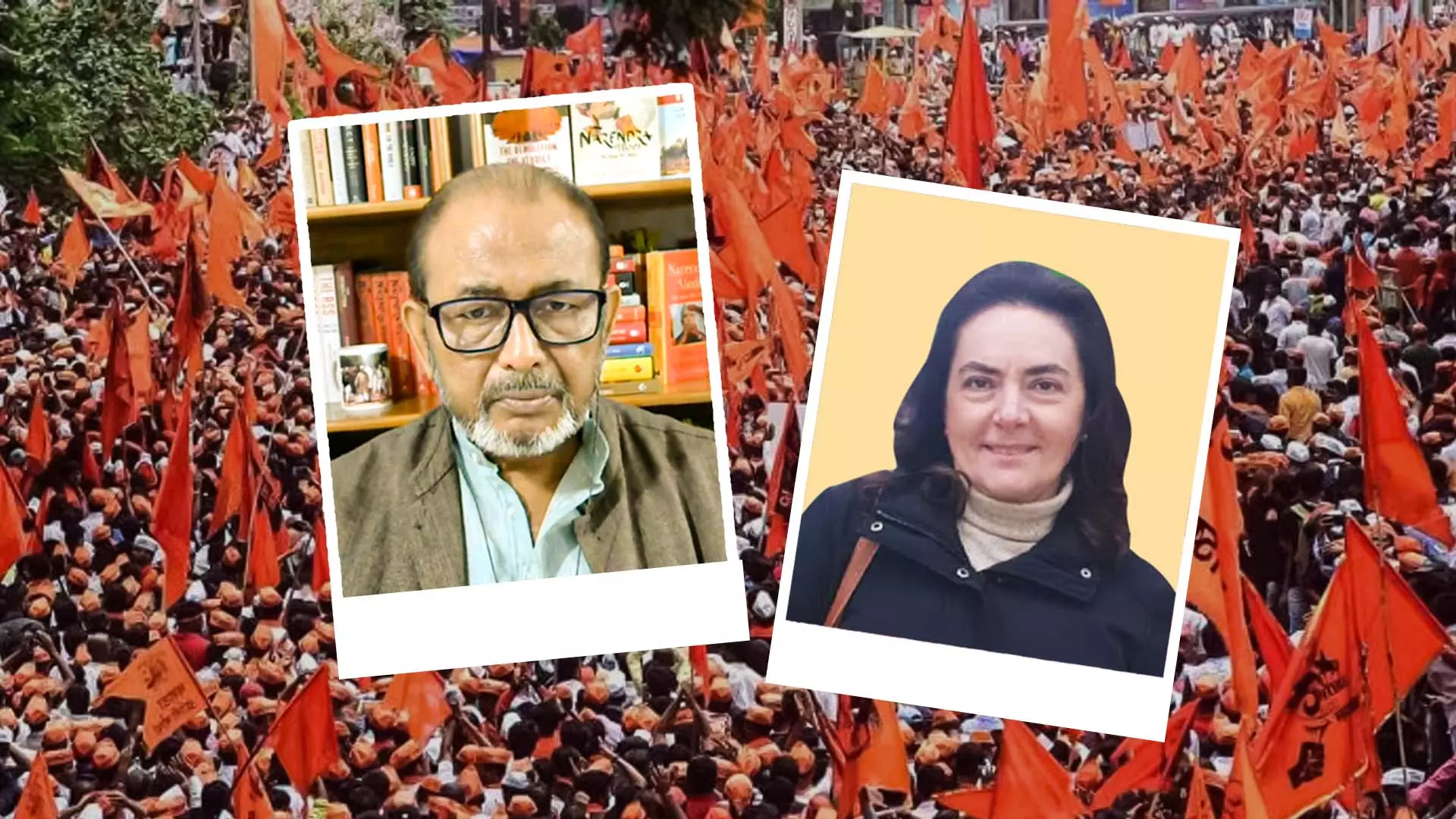
RSS at 100: How Italian fascism influenced Hindu nationalist politics
Prof. Marzia Casolari explains how Indian Hindu nationalist leaders drew inspiration from Italian and German fascism, shaping organizational structures, youth militancy, and political strategies

As the Rashtriya Swayamsevak Sangh (RSS) marks its centenary, The Federal speaks with Professor Marzia Casolari, an Italian scholar of Hindu nationalist politics. In a detailed conversation, she explores the connections between Italian fascism, key Indian leaders like BS Munje and Subhas Chandra Bose, and the long-term impact on Hindutva organizations.
To what extent were Indian Hindu nationalist leaders inspired by European fascism in the 1930s?
BS Moonje (Hindu Mahasabha leader) visited Italy in 1931 after attending the Round Table Conference in London and met (Italian dictator) Mussolini. Moonje also explored Italian military academies and militant youth organizations, such as the Balilla and Avant Guard RSI. These groups trained youths in paramilitary drills and indoctrinated them in fascist ideals. Moonje wrote that he intended to reshape the RSS along these organizational lines, aiming to militarize Hindu society and promote Hinduization.
How did Moonje’s experiences influence the RSS and its founder, KB Hedgewar?
Moonje was Hedgewar’s mentor, and after returning to India, he helped establish institutions such as the Bhonsala Military School in Maharashtra. The goal was to train Hindu youth militarily and ideologically, reflecting what Moonje observed in Italy. This dual focus on militarization and Hinduization became a core feature of early RSS strategy.
Also read: How RSS has reshaped India’s history, politics: Historian Tanika Sarkar explains
Were there earlier contacts between Indian nationalist leaders and Italian fascists?
Rabindranath Tagore visited Italy in the early 20th century. Though Tagore was a pacifist, Italian scholars like Carlo Formichi and Giuseppe Tucci used his visit for propaganda, portraying him as supportive of fascism. These interactions were part of Italy’s broader strategy to cultivate influence among Indian intellectuals and undermine British authority.
What role did Giuseppe Tucci play in India?
Tucci was a prominent Italian scholar whose travels were financed by the Italian government. Appointed at Calcutta University, he promoted Italian fascism and built networks among young Indian intellectuals, aiming to create local supporters of the regime. This was aligned with Italy’s anti-British policies in India and the Middle East (West Asia).
Also read: RSS at 100: How relevant is the Sangh in Modi era? | Talking Sense With Srini
How did Italian consulates contribute to propaganda in India?
Italy operated consulates, not embassies, in colonial India. The Calcutta consulate actively financed publications, such as Amrita Bazar Patrika, to promote fascist ideas. Bombay became another centre later. The British were aware but lacked evidence for decisive action, though they did expel some consulate officials involved in propaganda.
Can you elaborate on Subhas Chandra Bose’s interactions with Italian fascists?
Bose visited Italy multiple times, including to organize the Congress of Asian Students in Rome in 1933. He was connected with the Institute for the Middle and Extreme Orient, under Giovanni Gentile’s patronage, which also served as a hub for Italian propaganda. Mussolini expected Bose and the Indian National Army (INA) to help overthrow British rule in India, though Bose faced limited support from Nazi Germany due to racial prejudices.
Also read: RSS at 100 | Was the Sangh anti-colonial? Not at all, says historian
Did Bose adopt a fascist ideology?
Bose was not fully a fascist. He was a hybrid, blending socialism with tactical alliances with fascist regimes to secure Indian independence. His goal was defeating the British, not implementing fascist governance in India.
How has fascist influence manifested in contemporary Hindu nationalist organizations?
Today, Hindutva organizations sometimes replicate methods of European fascists, particularly in targeting minorities. Attacks on Muslims and Christians mirror the paramilitary and ideological strategies of fascism, with organizational discipline and rhetoric designed to marginalize opponents.
Also read: RSS at 100: 'Hindu Mahasabha emerged because Congress avoided religious issues'
Is there a paradox in India’s support for Israel, given historical fascist sympathies?
The distinction lies between Jews and contemporary Zionism. Modern right-wing Zionism exhibits methods reminiscent of fascism, including nationalist extremism and suppression of opposition. Indian support aligns with current political strategy rather than contradicting historical Hindutva ideology.
The historical links between Italian fascism and Indian Hindu nationalist politics illuminate how global ideologies were adapted locally, shaping organizational structures, youth militancy, and political strategies that resonate even today.
(The content above has been transcribed from video using a fine-tuned AI model. To ensure accuracy, quality, and editorial integrity, we employ a Human-In-The-Loop (HITL) process. While AI assists in creating the initial draft, our experienced editorial team carefully reviews, edits, and refines the content before publication. At The Federal, we combine the efficiency of AI with the expertise of human editors to deliver reliable and insightful journalism.)

